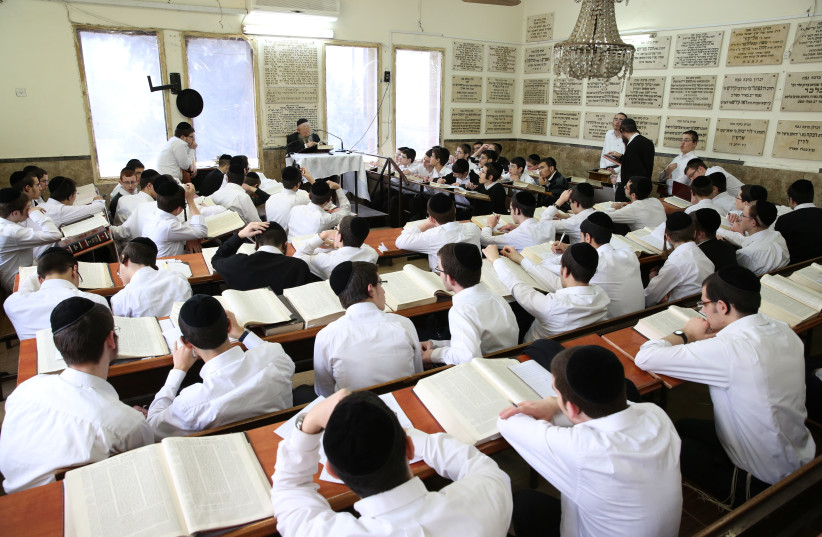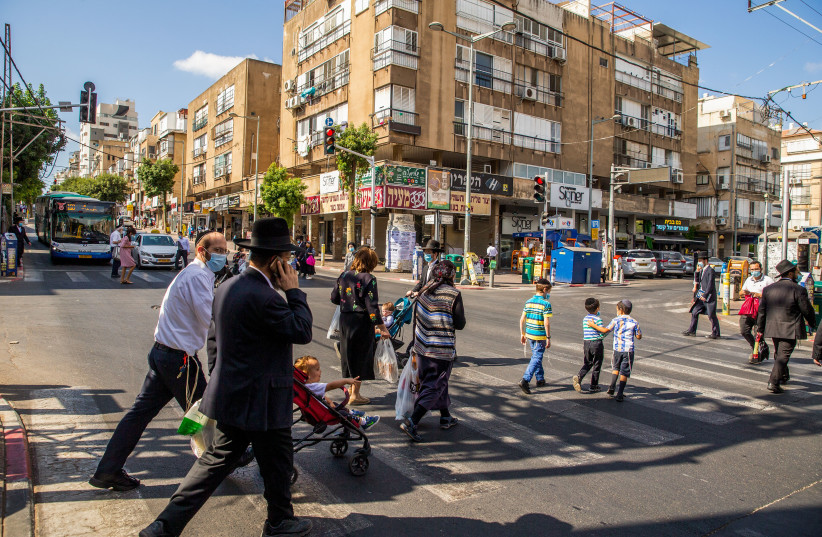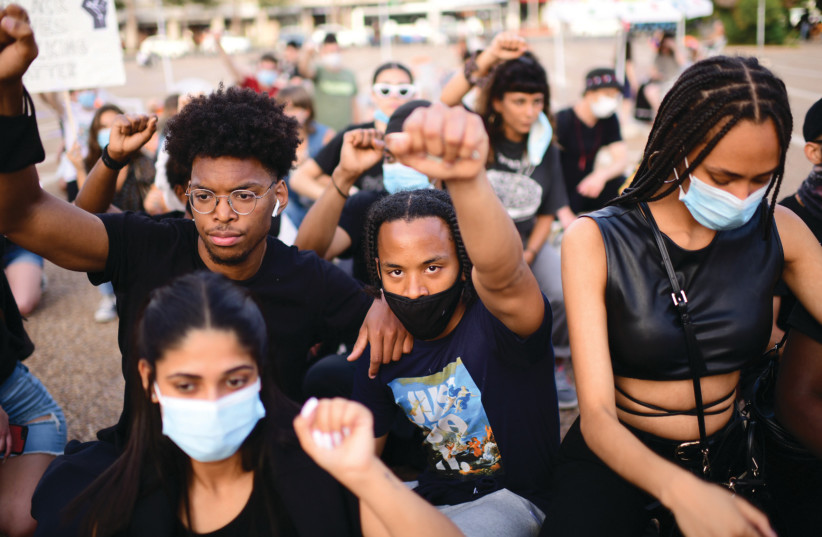Aweke Kobe Zena does not beat around the bush.
“There is racism in Israel. Racism has aspects in common with terror,” he told the Magazine in a recent interview. “Everyone says Israel’s biggest problem now is the social conflict element, not Iran.”
“There is racism in Israel. Racism has aspects in common with terror. Everyone says Israel’s biggest problem now is the social conflict element, not Iran.”
Aweke Kobe Zena, Israeli anti-racism czar
Zena heads the country’s anti-racism unit based within the Justice Ministry.
He explained his above comments, saying that “we need to educate the public. Institutions are made of people, and everyone eventually is impacted by one social circle or another. Racism in one place eventually impacts other places and people. So we need change everywhere in order that even some of the weaker sectors of Israel’s citizens will not feel alone.
“We have an opportunity,” he said. “We can fix the public sector, public services and the bedrock of Israel. We can also build up a wave of resilience and help the economy by reducing racism in the workplace. Social resilience and tolerance will also help us deal with outside problems,” such as actual terrorism and attempts by Israel’s enemies to destabilize society.

How did the 42-year-old Ethiopian immigrant get to this unique post, which itself is somewhat of an ongoing experiment?
In 1983, thousands of Jews in Ethiopia were informed that they could move to Israel. This included Zena’s family, who tried to make the move but were sidetracked and basically enslaved in Sudan for an extended period along the way.
Despite all the challenges, his family knew they were committed to either getting to Israel or dying while trying.
Once in Israel, Zena and his siblings learned fast how to become more Israeli. He spent a few months in a boarding school in sixth grade, which he would like to block out of his memory for the way he was mistreated.
But later in the IDF, he was accepted and respected as part of the special legal academic Atudah (study) program, where he excelled. With the rank of major, he still performs IDF reserve duty.
In 2006, he joined the state prosecution department, working in criminal litigation. By 2014, he was given special oversight responsibility for racism-related criminal cases.
DURING THAT period, Zena said that he started to see beyond the legal and litigation implications, especially regarding the lack of awareness of racism in Israeli society, among many other democracies.
“We don’t recognize this, but now I have studied it as an expert. I learned on the job,” he said, emphasizing that legal cases where racism is part of the mix need to have different approaches in terms of addressing the Ethiopian sector in Israel, as well as when to take a harsh approach for sentencing and when a lenient one.
Next, Zena was a member of the 2015 Emi Palmer Commission, which made recommendations for major reforms in a wide variety of government sectors and policy.
Still, when the opportunity came up to lead the new anti-racism unit, he was “worried about coming to this position, since I was doing well as a lawyer. Also, I was not sure I would be given all the tools and resources needed to implement the government’s campaign to combat racism and discrimination.”
But he took up the role in 2017, and his term was set for six years. It could theoretically be eight years, but it has not yet been extended. After being appointed as the anti-racism czar, he then had to build the unit from scratch – and he remains thankful to then-justice minister Ayelet Shaked.
“Shaked did something historic: establishing the Palmer Commission,” he said. “The entire budget for the commission and the unit” was from Shaked. “No one can take that away from her, as well as that she appointed three Ethiopian judges.”
Zena’s unit is supposed to focus on several different areas, the first of which is reporting periodically to the public and the government on where the struggle against racism stands.
In a report published in March, his unit said that around 48% of the 458 racist incidents in 2021 were against Arab or Ethiopian Israelis.
But the unit does not only deal with complaints of racism from Ethiopians and Arabs. It also frequently handles complaints from Sephardim, Russians and haredim.
Regarding haredim, he said that people who are anti-haredi “dump everything on them to hold them down. Prime Minister Yair Lapid has said that ‘antisemitism is racism. If you don’t think so, then you don’t understand.’”
He said racism can be poisonous for any sector where another group declares them as being threatening and dangerous and uses that excuse to try to divorce them from society.

Policy, education and training
Besides reporting on where racism is most problematic, Zena’s unit is also trying to change the broader systems operating in the country. For example, he said there had been systematic racism in the Rabbinate. “But now, after the 2019 announcement by the chief rabbi accepting Ethiopian Jews, things have changed,” he said.
Zena recounted how Rabbi Moshe Hablin of Kiryat Gat placed a blanket doubt on the Jewishness of Ethiopians. “Now there is a directive from the Chief Rabbinate that you cannot check how pure someone’s Jewishness is on the basis of their skin. They changed their policies, and a lot changed internally. There were many meetings, articles published and tough negotiations.”
The anti-racism czar said that Rabbi Yitzhak Yosef understood the consequences of leaving a halachic question mark about the Jewishness status of Ethiopian-Israelis, so he helped remove it.
Regarding reforming the police, Zena noted that in December 2021, an additional High Court of Justice appeal was rejected when the justices recognized that “someone’s skin could not be the legal basis for anything.”
According to Zena, the old police rules allowed them to demand that Ethiopian-Israelis should be required to produce their identity card even in the absence of probable cause that they were the suspects of a crime. He said one reason the police picked on Ethiopians was that it was simpler in the field to visually identify them for being checked based on their skin.
But even before the ruling and especially following it, he said, “The police have been working with us. They appointed Hod Levi to work on the racism issue. It takes time to internalize the necessary changes. No police officer wants to admit fault on this issue.”
But he said that it was obvious change was needed because there have been so many incidents in the field of routine, low-grade problems that should end with no drama and maybe a small ticket or verbal warnings, but instead have ended in death, like the infamous murder in the US of George Floyd by a police officer in May 2020.
Zena asked in frustration how a policeman who was not racist could shoot or choke to death someone like Floyd over a $20 (NIS 69) violation or minor theft.
“It is because they don’t see him as a human; there is no empathy,” he said. “This is what is terrible about racism. You do things in a barbaric way. You act like you are threatened, but then this leads to thinking the person under your knee is not a human, [but that] he is an animal.
“Organizations need to take responsibility for eliminating racism within their walls because it is a system-wide problem. If they take responsibility, then we can accomplish things. The IDF does this relatively well,” the anti-racism czar said. “An incident needs to be shut down fast to avoid it erasing proper norms on a broader basis.”
ANOTHER WAY his unit tackles system-wide problems is with meetings and seminars.
On May 25, his unit managed a large meeting at the President’s Residence – with Police Chief Kobi Shabtai, Public Security Minister Omer Bar Lev and 50 other senior officials from the National Fire and Rescue Authority and the Israel Prisons Service – to increase awareness of racism.
On June 12, they held another meeting with other professionals in government about how to catch racism and how to prevent the next case of it. “We try to influence the picture out in the field based on top-down orders from the relevant headquarters,” Zena said.
In addition, there is now 10 days of professional training for a number of agencies to explain what racism is and how racist processes work in government, as well as to advise ministry directors-general on their policies. There are also monthly meetings among officials involved with addressing racism throughout the government, and they issue regular internal reports.
Despite all of these many projects, the unit itself has only four full-time employees besides Zena.
A lot of the other work gets done by about 70 other people working in various government agencies.
These officials, Zena noted, need to report to his unit whenever they are sending anything out. He hopes to maximize improvement on this issue but cautioned that it is hard to get them to help, since there naturally are built-in pressures on them to work in a way that does not conflict with other priorities of their offices.
Zena said that since there is currently only a general directive, the appointee for anti-racism in the particular office may hesitate to report it while claiming that they are self-motivated.

Specific incidents
Regarding specific incidents, Zena noted that former top police official and Public Security Ministry official Moshe (Shiko) Edri said there were anonymous tips regarding yeshiva racism against Ethiopians that were sent to the Civil Service Commission’s disciplinary body, which frequently works with his team. A probe found that racism had indeed occurred. Former public security minister Amir Ohana tried to address the issue, but legislation is needed, Zena said.
In another instance, “A court staff member sent a WhatsApp message demeaning Ethiopians. ‘How is this Ethiopian black person essential during corona?’ He received a censure as part of a disciplinary hearing, as well as a fine.” Even in that case, it is hard to fire people.
Two issues led to firings in 2018. Rehovot deputy fire department chief Shmuel Hajbi verbally accosted an Ethiopian fireman – saying ‘You go back to the jungle’ – and was fired.” In the tax authority, an employee said that it was “too bad there aren’t 100 people killed (meaning 100 people like you). He was fired in mid-August.”
Zena said his unit handles new complaints within the first two weeks. Depending on the issue, they might refer the matter to the disciplinary body; if it is an issue related to products or the private sector, they might offer someone legal aid to pursue a civil claim.
Regarding filing civil claims, Zena told a story about a Dan bus driver from March 2018, who was fined and had to issue a public apology to five Ethiopian children. He refused to let them on the bus, saying he “did not want problems.” The legal assistance division kicked into gear, declaring this was a blatant case of discrimination on public transportation. There was a similar case of discrimination on buses in June 2021.
Another victory they had was against the owner of a bed and breakfast tzimmer who refused to rent his unit to an Ethiopian.
In Ramla, a religious school refused to let a student from an Azerbaijani background attend, noting that the student had a weird name. Zena’s office intervened, helping the student go after the school in court; the school eventually let the child attend classes there and fired the principal.
Despite these successes, Zena said there are private clubs that can set rules about who they let in. He noted that the Palmer Report criticized this state of affairs and said a message needed to be sent to prevent discrimination even in those private establishments.
“If I had Knesset-endorsed authority, I could do more. As things stand, I cannot even fire people for racism. Mostly, I can wag my finger in their face to try to shame them into compliance.”
“If I had Knesset-endorsed authority, I could do more. As things stand, I cannot even fire people for racism. Mostly, I can wag my finger in their face to try to shame them into compliance.”
Awake Kobe Zena

Arabs/Druze
Regarding Israeli-Arabs, he said that communities in the center of the country do not want to take them in as residents. Also, he said there is improper airport profiling. “There was a lawsuit against El Al about this. I am against profiling as they are currently doing it because we are a country of rules. If you do profiling objectively, look for actions,” which he would support. “But you cannot declare 20% of the population dangerous.”
Regarding Yishuv (residential commuity) Acceptance Committees accused of discriminating against Israeli-Arabs, Zena said, “We have limited resources, so we do not get into this. We do coordinate, but we do not make policy. If someone asked for our position before the High Court of Justice we would give it, but nobody did, so the High Court did not see our position. Our hands are tied.”
According to Zena, “They will never be objective. If they are allowed to continue to exist, they need to be overseen by an external official because anyone on these committees can fake a serious-sounding reason for rejecting someone, when the real reason is racism.”
“If racism against Arabs is allowed, it will not remain limited to Arabs; it always ends up expanding and flowing out against others,” said the unit’s anti-racism chief.
“If racism against Arabs is allowed, it will not remain limited to Arabs; it always ends up expanding and flowing out against others... If we succeed in fighting racism, then we can defeat antisemitism.”
Awake Kobe Zena, Israeli anti-racism czar
Moreover, he said, “If we succeed in fighting racism, then we can defeat antisemitism.”
Also, he said that when foreign countries see someone like me combating racism on behalf of Israel, as during a visit to Germany, it elevates positive feelings for Jews around the world.
Moving on to discrimination against Druze-Israelis, he said the issue is that “they look like Arabs, so many people define them as Arabs. There was a senior Druze official in the IPS [Israel Prison Service] and one in the Border Police. They were with a group, and only they were humiliated.”

Haredim
Zena was upset in regard to haredim. “We do not succeed in defending them against incitement in some cases. Haredim filed 85% of coronavirus era-related complaints. People hated them and could easily identify them by their distinctive clothing. People said they got sick more and that they don’t follow the rules.”
“We do not succeed in defending them against incitement in some cases. Haredim filed 85% of coronavirus era-related complaints. People hated them and could easily identify them by their distinctive clothing. People said they got sick more and that they don’t follow the rules.”
Aweke Kobe Zena, Israeli anti-racism czar
He said that it was hard to engage the media on the issue. “We put together an item for the media on discrimination against haredim, but no one wanted it.” Elaborating, he said that people wouldn’t sell them eggs, and health clinics and buses would not take them. During the height of the pandemic in Bnei Brak, a cellphone service provider refused to enter the city.”
Going back to the big picture, he reflected on recommendations in 2018 to reform aspects of the Education Ministry regarding racism problems, such as new training of teachers on the subject and appointing a point-person in the ministry to focus on combating racism. There was an updated July 28 ministry report on racism, which he said could make a strategic difference on the issue.
Regarding migrants, Zena said that Israel can protect them or there will be no rules. He criticized the policy of forcing migrants to renew their residency every three months because it disrupts their lives.
“I am very worried about what will happen to Israel” if racism issues are not fully addressed, he said.
Addressing the increase in racism on social media, he said that “social media is a big problem. It is very hard because we do not have authorities there, so I cannot fix racist posts online. I can ask the cyber prosecution division to address it, but only in very extreme cases. Also, we have limited resources, so it is hard to follow online posts proactively. Certainly, we would follow online posts much more if we had more resources.
“The independence of the unit for fighting racism is crucial,” he said. “We should also deal with the Internet but the law must be extended” to grant us authority there first.

The future
Regarding the future, he warned that “no legislation has been passed to date regarding the unit’s authority and jurisdiction, so the government could close us if we upset certain sectors.”
In some ways, the unit was already weakened recently.
Asked about Ethiopian MKs in the Knesset, Zena said they are generally working to help on the issue every day, “but in terms of concrete help for our struggle, [Likud MK] David Bitan’s letters helped push the processes forward the most, and he has given the unit critical backing.” Bitan was chairman of the Immigration and Absorption Committee in the previous, 23rd Knesset.
Zena lamented that the law for supporting his unit’s initiatives regarding civil lawsuits against racism was not extended. In fact, it expired in November 2021 despite all relevant authorities knowing it was going to happen. In June of this year, there was an effort to extend the law in the Knesset Constitution, Law and Justice Committee, but according to Justice Minister Gideon Sa’ar, it was blocked by the opposition, especially the haredi parties.
It seems that extending the authorities did not make it onto the list of laws that the coalition was willing to pass without any opposition support. Today, many of the victories against the tzimmer, the airport and others might not have happened.
Zena has accomplished a lot in many different arenas, but the future of his unit – and how much the government will invest directly to combat racism in Israel – is still very much an open question.
